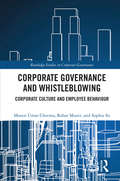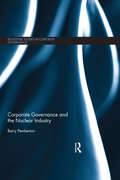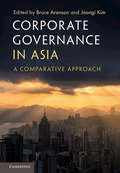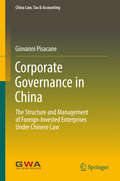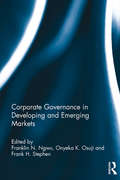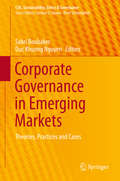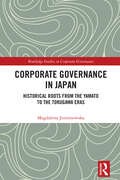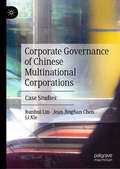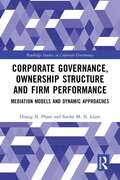- Table View
- List View
Corporate Governance and Whistleblowing: Corporate Culture and Employee Behaviour (Routledge Studies in Corporate Governance)
by Rahat Munir Moeen Umar Cheema Sophia SuWhistleblowing is often about disclosing wrongdoings by members of organisations to persons or organisations that may be able to effect action. Media would at times publish stories of whistleblowers who engage in ‘heroic’ acts of exposing wrongdoings at work, but the whistlebowers often face significant negative consequences of their whistleblowing efforts. This book examines effects of national and organisational cultures on the whistleblowing decisions of employees. The book provides empirical evidence of association between organisational culture and whistleblowing and there appears to be a lower likelihood of whistleblowing in organisations that focus more on the cultural dimensions of respect for people, innovation and stability. It also illustrates how remaining silent or blowing the whistle in response to observed wrongdoings affects employees’ key work-related attitudes. This book would interest those wish to gain better understanding of the relationship between culture and whistleblowing in organisations.
Corporate Governance and the Nuclear Industry (Routledge Studies in Corporate Governance)
by Barry PembertonCorporate Governance and the Nuclear Industry explores the UK nuclear Legacy - governance issues associated with the decommissioning of a range of early-generation civil nuclear facilities. This book traces how we got here and the risks that have been taken, whilst presenting new research and thinking that is required to manage our nuclear Legacy. The book addresses a new analytical approach using notions of governance to review key historic events. This approach analyses these events using concepts of stakeholder control, accountability and regulation. Using these concepts and undertaking a more detailed analysis of the Legacy’s current governance arrangements; the conventional public sector-based solutions that attempt to harness private sector expertise, this book will contrast these with government responses to determine the degree of control over the Legacy and any possible control issues. Corporate Governance and the Nuclear Industry concludes that we need to recognise the legacy’s problems as exceptional rather than prosaic, and suggests that this requires exceptional governance solutions rather than the current form that is clearly failing.
Corporate Governance for Climate Transition
by Carolina Machado João Paulo DavimThis book is a focussed and up-to-date review about the key challenges, trends, implications, strategies, and ways of overcoming, that dynamic and competitive organizations are facing now and increasingly in future by climate change. The book creates a better understanding of the impacts that climate transition will have on organizations and how they are responding to find opportunities while overcoming the risks. What corporate governance models can and are organizations developing? What climate transition strategies are organizations creating? Who should be involved in the decision-making processes? To what extent are principles of transparency, equity, participation, inclusion, effectiveness, and efficiency present in corporate governance for climate transitions? These and other issues are just a few of the challenges that organizations by the climate change transition.International experts from a wide range of disciplines and perspectives have been invited to contribute to this book in order for providing a comprehensive and informed perspective for researchers, corporate leaders and students of business and management as well as environmental studies.
Corporate Governance in Action: Regulators, Market Actors and Scrutinizers (Routledge Studies in Corporate Governance)
by Lars EngwallOver time we have seen large corporations, in many cases with multinational operations, begin to play an increasingly significant role in modern society. This in turn has put the governance of these corporations into focus. Against this background, Corporate Governance in Action helps provide a framework for examining corporate governance through a focus provided by external pressures on large corporations. It also brings together the approach of economics and finance with theories in organization studies, such as aspects of resource dependency theory. This framework takes into consideration not only the market relations of modern corporations but also their dependence on regulators and different kind of scrutinizers. This thoughtful book is a complete research guide that provides a new understanding and applicable framework for advanced students, academics and researchers in the area of corporate governance and the related disciplines.
Corporate Governance in Africa (Routledge Studies on Law in Africa)
by Victor EdiagbonyaThis book discusses the issue of limited stakeholder recognition and protection of stakeholder interests within the Anglo-Saxon corporate governance model practised in many sub-Saharan African countries.The volume argues that the relative success of the Anglo-Saxon model in developed economies is attributed to the presence of functional institutions, such as effective legal systems, active external markets for corporate control, and organised civil societies, among others. Many African countries, such as Nigeria and South Africa, have adopted the UK corporate governance framework despite facing challenges occasioned by an inefficient legal system plagued by systemic corruption. Given the challenging institutional contexts in African countries, this book proposes an alternative corporate governance framework – the functional stakeholder model (FSM) – for the banking industry in countries facing similar institutional challenges; the FSM aims to promote stakeholder recognition and the protection of stakeholders' interests. The book draws on stakeholder and institutional theories in designing an alternative corporate governance model, the ‘FSM’ for banks operating in challenging institutional contexts.The book will interest regulators, bankers, auditors, academia, policymakers, and researchers in comparative corporate governance and financial regulation, especially banking regulation and stakeholders in developing and emerging markets.
Corporate Governance in Africa: Assessing Implementation and Ethical Perspectives
by Kerry E. Howell M. Karim SorourUsing a range of case-studies, thisbook analyzes corporate governance relationships between several Africancountries and the international community, providing an ethical assessment ofissues surrounding globalization and adherence to external governancemechanisms. Employing a methodological approach, Corporate Governance in Africa critiques occidental perspectives ofcorporate governance in relation to the needs of separate states, and thecontradictions that arise when local cultures are not taken in toconsideration. With case studies from Egypt, Ghana, Nigeria, South Africa,Kenya and The Gambia the book presents a comprehensive view of North, East,West and South Africa with contributions from global experts in the field. Theauthors critique the transformations deemed necessary for governance proceduresin order to facilitate confidence and inward investment for these Africanstates.
Corporate Governance in Asia: A Comparative Approach
by Bruce Aronson Joongi KimCorporate governance in Asia continues to attract global interest due to its critical importance to the world's fastest-growing region. The study of governance systems remains complicated by Asia's mix of legal traditions, market systems and social history. This comprehensive textbook provides a comparative overview of the corporate governance framework, theory and practice in major Asian countries. Students at all levels will gain an understanding of corporate governance systems in Asia and how they compare with models attributed to the US, the UK and Europe. Featuring six foundational chapters focusing on general theory and corporate governance systems and eight country-specific chapters, this book can be used as the basic textbook for a general course on comparative corporate governance or as an essential reference about corporate governance in Asia for a wide variety of professionals including academics, jurists, students, practitioners, investors, creditors, policymakers and analysts.
Corporate Governance in Banking and Investor Protection: From Theory to Practice (CSR, Sustainability, Ethics & Governance)
by Samuel O. Idowu Philip Molyneux Belén Díaz DíazThis book explores the status quo of corporate governance in banking and investor protection from both theoretical and practical perspectives. Bringing together original conclusions with a regional and international focus, it provides a timely and comprehensive overview of the effectiveness of corporate governance in the financial sector and an assessment of investor protection. It also includes a number of examples and case studies to illustrate the findings. The book compares corporate governance in the banking and financial industries before and after the financial crisis, and helps to evaluate the effect of the recommendations and regulations that have been developed in the interim.
Corporate Governance in Central Europe and Russia: Framework, Dynamics, and Case Studies from Practice (CSR, Sustainability, Ethics & Governance)
by Samuel O. Idowu Maria Aluchna Irina TkachenkoThis book examines corporate governance through a holistic lens that integrates financial, social and environmental goals, e.g. increasing transparency and disclosure. In addition, it investigates the theoretical assumptions guiding the current corporate governance practices adopted by companies in Central Europe and Russia. The book presents a dynamic study on the evolution of corporate governance systems, which were practically non-existent just 30 years ago. In turn, it addresses criticism leveled at corporate governance, its impact on the outbreak of the financial crisis, and recommendations for changes after the crisis. The book employs a regional focus, exploring a group of countries that have often been neglected in corporate governance research. Carefully selected data and a variety of case studies prepared by leading authors from the region provide evidence to support the analysis.
Corporate Governance in China: The Structure and Management of Foreign-Invested Enterprises Under Chinese Law (China Law, Tax & Accounting)
by Giovanni PisacaneThis book provides useful tools and information to help readers understand the key factors involved in organizing, structuring and managing a company in China. It achieves this by focusing on the critical issues that foreign investors and professionals encounter in China and using a clear and practical overview of Corporate Governance, Structure and Management of Foreign-Invested Enterprises under Chinese Law following the introduction of the 2015 Draft Foreign Investment Law. This latest reform project will likely have a major impact on the investment landscape, as it calls for the replacement and unification of the three Foreign Investment Laws currently in place, resulting in important changes in the legal framework governing foreign investments. The book examines company structures, together with their functions and relevant liabilities. Further, it addresses the respective positions held in a company in order to better understand the stakes each holds in Corporate Governance: the shareholders, legal representative, board of shareholders, board of directors, board of supervisors and the general manager. Unique aspects of the Chinese company system are also highlighted, such as company seals, shareholders' rights and potential company deadlock. As such, the book represents an essential overview of the current concerns regarding Corporate Governance in China, offering readers a broad perspective on the Chinese legal system and answers to the most frequent questions that arise.
Corporate Governance in Developing and Emerging Markets
by Franklin N. Ngwu Frank H. Stephen Onyeka K. OsujiThroughout the world, the Anglo-American model of corporate governance tends to prevail – but no two countries are identical. Governance outcomes in developing and emerging economies often deviate from what theory predicts, due to a wide range of factors. Using insights from New Institutional Economics, Corporate Governance in Developing and Emerging Markets aims to explain the different issues and cultural and legal factors at play, and put forward an alternative governance framework for these economies. Structured in three parts, this text investigates different models of corporate governance; it explores the realities of corporate governance in ten nations, including the ‘BRICS’ (Brazil, Russia, India, China and South Africa) and ‘MINT’ (Mexico, Indonesia, Nigeria and Turkey) countries; and then considers corporate governance reform. This interdisciplinary text will be a valuable tool for students of corporate governance across Business, Economics and Law; and an equally useful resource for anyone working in or carrying out research in this area.
Corporate Governance in Emerging Markets: Theories, Practices and Cases (CSR, Sustainability, Ethics & Governance)
by Duc Khuong Nguyen Sabri BoubakerThis book fills the gap between theories and practices of corporate governance in emerging markets by providing the reader with an in-depth understanding of governance mechanisms, practices and cases in these markets. It is an invaluable resource not only for academic researchers and graduate students in law, economics, management and finance but also for people practicing governance such as lawmakers, policymakers and international organizations promoting best governance practices in emerging countries. Investors can benefit from this book to better understand of these markets and to make judicious investment decisions.
Corporate Governance in Government Corporations (Law, Ethics and Governance)
by Michael J. WhincopMany governments across the world have responded to the need for greater efficiency in the delivery of government services by the reorganization of these bureaucracies along the lines of for-profit business corporations. In doing so, governments have relied on the capacity for governance practices to overcome the weaker incentives created by the attenuated 'property rights' that are created in public enterprise.
Corporate Governance in Japan: Historical Roots from the Yamato to the Tokugawa Eras (Routledge Studies in Corporate Governance)
by Magdalena JerzemowskaThe roots of corporate governance are rarely looked for in the ancient history of countries. Literature pays not enough attention to the impact of the country’s history on the relations between economic actors and owners, known today as corporate governance. Many countries are guided by centuries-old traditions and customs, which is especially true of Japan. Japan is of particular interest because history of its corporate governance is not widely known and because it has developed a unique corporate governance model. This book aims to diagnose and trace the causes and symptoms of this uniqueness, emphasizing that it is a lasting legacy of previous eras. It examines key political, social, cultural, and economic events in Japan from its dawn till the 17th century in a comprehensive way and in the cause-and-effect aspect, combining the history, economic history, and the history of corporate governance. It refers to little-known issues considered in the context of a very interesting and successful country and economy, which may arouse the desire to expand knowledge and learn about the roots of these successes. The innovative nature of the research goal and the simplicity of presentation are the advantages of this book.
Corporate Governance in the Banking Sector in China (CSR, Sustainability, Ethics & Governance)
by Weikang ZouFocusing on the dichotomous and comparative analysis of the legitimacy, paradigm, and operating frames of bank governance and its reproduction in the new financial regime following the global financial crisis, this book examines in depth how corporate governance in bank institutions is legitimized, justified, and delivered in diversified financial models and their influences on the Chinese banking industry. By combining this type of financial model analysis with the new institutionalism theory, the book lifts the mysterious veil from corporate governance in Chinese banking institutions with regard to its establishment and constant changes. Through a kaleidoscope lens and by conducting a “layer by layer” diagnosis, the book tells the “background stories” of the complex settings for Chinese financial institutions, asks and answers the paradigmatic question of for whom banks are actually run and governed, and mind-maps the main corporate governance mechanisms and practices prevalent in Chinese banks.
Corporate Governance in the Banking Sector: Theory, Supervision, ESG and Real Banking Failures (Contributions to Finance and Accounting)
by Bruno Buchetti Alessandro SantoniThis book gives an overview of the most important theories on Corporate Governance, investigating the myth and the reality of it. It argues that within the banking sector exist two new agency costs (i.e., bank depositors and shareholders vs. directors and bank depositors vs. shareholders and directors). These agency problems are difficult to reduce for two reasons. First, banks are complex and opaque. Second, government implicit guarantees and the deposit insurance systems reduce the monitoring of depositors. This book also takes a deep dive into research on CG in the banking sector via a unique and innovative literature review covering the time period between 2000-2020. It finds that some specific CG characteristics affect banks: risk appetite, performance, accounting quality, compensation and corporate social responsibility disclosure. Furthermore, this publication contends that institutional investors are changing CG for the better, describing how major financial markets factors such as rating agencies and sell-side financial analysts make CG visible. Additionally, it investigates how managerial biases and irrational investors can affect CG negatively, leading to company distress. All-in-all, this book makes a threefold contribution: for regulators, it offers suggestions on how to improve banks’ supervision; for researchers, it suggests new research topics; and for practitioners, it connects CG theory with real cases of CG failure.
Corporate Governance in the Banking and Financial Sector: Innovations and Adaptations in a Changing Landscape (Palgrave Macmillan Studies in Banking and Financial Institutions)
by Jonathan Williams Timothy KingThis book examines several contemporary issues which are shaping corporate governance in the banking sector. These issues have been evolving over the past decade and even more so since the Global Financial Crisis (GFC, 2007-09) revealed many significant weaknesses in corporate governance structures at banks. Alongside major reforms to the architecture of the global financial system, like the introduction of the Basel 3 Accord, the post-GFC emergence of new issues and acceleration in the importance of others is affecting banks, their competitiveness and business models, and their governance structures. For instance, the emergence and rapid growth of FinTech (financial technology), the increasing focus of government and society on CSR (corporate social responsibility) and ESG (environment, social and governance) investing that speaks to the generational issue of the environment, climate change and associated risks. On top of these developments came the COVID-19 health pandemic that has impacted banks and significantly increased the rate of digitalization. Given the many challenges culminating around banks, this book in three sections provides a timely comparison of the factors influencing corporate governance at banks before and after the GFC, and will be of interest to researchers and students in banking and corporate finance alongside practitioners and policymakers.
Corporate Governance in the Common-Law World
by Christopher M. BrunerThe corporate governance systems of Australia, Canada, the United Kingdom, and the United States are often characterized as a single "Anglo-American" system prioritizing shareholders' interests over those of other corporate stakeholders. Such generalizations, however, obscure substantial differences across the common-law world. Contrary to popular belief, shareholders in the United Kingdom and jurisdictions following its lead are far more powerful and central to the aims of the corporation than are shareholders in the United States. This book presents a new comparative theory to explain this divergence and explores the theory's ramifications for law and public policy. Bruner argues that regulatory structures affecting other stakeholders' interests - notably differing degrees of social welfare protection for employees - have decisively impacted the degree of political opposition to shareholder-centric policies across the common-law world. These dynamics remain powerful forces today, and understanding them will be vital as post-crisis reforms continue to take shape.
Corporate Governance in the Knowledge Economy: Lessons from Case Studies in the Finance Sector (Palgrave Studies in Accounting and Finance Practice)
by Paul David GriffithsWith the transition into the Knowledge Economy, a formidable series of new challenges arise within the corporate governance space. This book tackles the issue of corporate governance along two axes. Firstly, it confronts the developments in corporate governance within the context of the Knowledge Economy and all its implications in relation to the pre-eminence of intangible assets, the advent of technologies such as smartphones and advanced forms of artificial intelligence, and cultural changes associated with the incorporation of Gen Y into the workforce and the proliferation of social networks and effects such as Big Data and cyber-threats. Secondly, it highlights the challenges for multinational organizations and the tension that exists between headquarters and subsidiary offices due to the need to combine the corporation’s ethical culture and corporate governance values with the institutional forces of the subsidiaries’ context. The combination of these two axes addressed viz a viz the relationship between senior management and the rank and file of the organization to create an ethical corporate culture leads to a completely different positioning of corporate governance and make the book truly unique and of interest to researchers, students of corporate finance and corporate governance alongside practitioners within financial organizations and more broadly.
Corporate Governance in the United Kingdom: Past, Present and Future
by William Forbes Lynn HodgkinsonThis book provides an overview of the development of corporate governance with a focus on literature concerning the UK.
Corporate Governance of Chinese Multinational Corporations: Case Studies
by Jean Jinghan Chen Runhui Lin Li XieThis book is the first to explore the issue of corporate governance in China's new corporations. With rapid development over the last two decades, China has seen compelling achievements in overseas investment. Specifically, an increasing number of Chinese companies have been “going out” to become multinational enterprises. From the practical view, corporate governance issues have been identified in the literature as one of the most important factors in determining whether these Chinese multinational enterprises succeed or not. However, existing literature provides little investigation and understanding about corporate governance of Chinese multinational enterprises. This book fills that gap and will be of value to corporate executives, scholars of China's economy, and journalists.
Corporate Governance, Capital Markets, and Capital Budgeting: An Integrated Approach (Contributions to Management Science)
by Sardar M. Islam Baliira KalyebaraThe primary contribution of this book is to integrate the important disciplines which simultaneously impact the investment appraisal process. The book presents a study that develops a new approach to investment appraisal which uses a multiple objective linear programming (MOLP) model to integrate the selected disciplines which include capital markets, corporate governance and capital budgeting. The research covers two case studies, one in the e-commerce sector and another in the airline industry in which the above disciplines are integrated. Readers from the areas of corporate governance, regulation, and accounting would find the survey of different approaches and the new integrated optimization approach particularly useful.
Corporate Governance, Organizational Ethics, and Prevention Strategies Against Financial Crime (CSR, Sustainability, Ethics & Governance)
by Narjess Boubakri Hyacinthe Yirlier Somé Omrane GuedhamiThis book examines how corporate ethics, social responsibility, and prevention strategies against financial crime may remedy shortcomings of corporate governance. Corporate governance structures and mechanisms may contribute to enhancing the value of integrity in organizational life. Nonetheless, executives and directors who emphasize a structural and procedural way of thinking often miss the point. Corporate governance structures and mechanisms can favor practices of integrity and righteousness. But those structures and mechanisms have deficiencies since they cannot allow the organization to avoid corporate deviancy and delinquency. The book describes how corporate governance and social responsibility reports and programs may allow executives and directors to deepen the meaning of corporate governance, as it is related to organizational culture. Furthermore, the volume discusses how corporate governance structures and mechanisms (including the board of directors and shareholder activism) might have a significant impact on the way integrity is safeguarded in an organization. The contributions shed light on methods to clarify and extend the implications of corporate governance while taking risk management strategies into account.
Corporate Governance, Ownership Structure and Firm Performance: Mediation Models and Dynamic Approaches (Routledge Studies in Corporate Governance)
by Sardar M. Islam Hoang N. PhamThe relationship between ownership structure and firm performance has been studied extensively in corporate finance and corporate governance literature. Nevertheless, the mediation (path) analysis to examine the issue can be adopted as a new approach to explain why and how ownership structure is related to firm performance and vice versa. This approach calls for full recognition of the roles of agency costs and corporate risk-taking as essential mediating variables in the bi-directional and mediated relationship between ownership structure and firm performance. Based on the agency theory, corporate risk management theory and accounting for the dynamic endogeneity in the ownership–performance relationship, this book develops two-mediator mediation models, including recursive and non-recursive mediation models, to investigate the ownership structure–firm performance relationship. It is demonstrated that agency costs and corporate risk-taking are the ‘missing links’ in the ownership structure–firm performance relationship. Hence, this book brings into attention the mediation and dynamic approach to this issue and enhances the knowledge of the mechanisms for improving firm’s financial performance. This book will be of interest to corporate finance, management and economics researchers and policy makers. Post-graduate research students in corporate governance and corporate finance will also find this book beneficial to the application of econometrics into multi-dimensional and complex issues of the firm, including ownership structure, agency problems, corporate risk management and financial performance.
Corporate Governance, Responsibility and Sustainability: Initiatives In Emerging Economies
by Arindam Banik Ananda Gupta Pradip BhaumikCorporate Governance, Responsibility and Sustainability investigates various dimensions of corporate governance issues in key emerging economies such as China, India, Brazil, South Africa and Russia. The book explores a number of issues in the areas of corporate governance framework, market discipline and building an efficient, competitive market.
